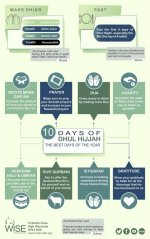7 Good Deeds For The Day Of Arafat
What Is The 'Day Of Arafat'?
The day of Arafat (or Arafah) is the 9th day of the month of Dhul Hijjah on the Islamic calendar. It occurs near the end of the Hajj pilgrimage as pilgrims stand on the plain of Arafat to perform prayers, supplications, and acts of worship.
Allah perfected the religion of Islam for Muslims on the day of Arafat. It is also the day on which the Prophet (PBUH) delivered his last sermon usually referred to as his Farewell Sermon (in Arabic: Arabic: خُطْبَةُ الْوِدَاع, Khuṭbatu l-Widāʿ), in which he affirmed the sanctity of human life and the abolition of racism. This sermon included the Verse of the Perfection of the Religion (in Arabic آیَة إِکْمَال الدِّيْن, Āyat Ikmāl ad-Dīn):
"This day have I perfected your religion for you, completed My favor upon you, and have chosen for you Islam as your religion." (Surah Al Ma'idah, 5:3)
In normal years, over 2.5 million pilgrims or more visit the plain of Arafat during Hajj, the annual pilgrimage to Makkah, Saudi Arabia. This represents the finale and climax of the Hajj journey, the pilgrims' most important ritual.
Abdu Rahman ibn Ya'mar reported: The Messenger of Allah (Peace and Blessings Be Upon Him) said: "The Hajj is Arafat. Whoever reaches the night of Arafat before the rising of the sun at dawn the next day, has completed his pilgrimage." (Sunan al-Nasa'i)
The Prophet compared Arafat Day to a day of celebration (Eid). While it is not technically Eid, it is a celebration since it marks the end of successfully completing the annual Hajj journey. It should be a joyful moment, as well as a time of reverence and dedication.
'Uqbah ibn Amir reported that Prophet Muhammad (PBUH), said: "The day of 'Arafat, the day of sacrifice, and the three following days (tashriq) are our celebration for the people of Islam. They are days of eating and drinking." (al-Tirmidhi
Blessings of Arafat Day
A Release From Hellfire
Arafat is one of the most auspicious occasions in Islam because Allah SWT releases more Muslims from Hellfire and forgives more sins on this day than on any other. Arafat is one of the greatest days to strive in worship, good actions, and especially to enhance our supplications for this reason (Dua).
Aisha (May Allah Be Pleased With Her) reported that Prophet Muhammad (PBUH), said: "There is no day upon which Allah frees more of his servants from the Hellfire than the Day of Arafat. He draws near and then he praises them to the angels, saying: What do they want?" (Muslim)
Dua On Arafat Day Is Accepted
There are countless instances of Muslims expressing how the dua they made on Arafah day altered their lives completely. The Prophet's (PBUH) companions would prepare the dua they would make on that day from the previous year, indicating how essential it is to them and to Allah SWT.
Even if you are not completing Hajj on this day, you can still benefit from the power of Dua (supplication). As said by the Prophet (PBUH) in this Hadith: "The best supplication is the one made on the Day of Arafah." (Tirmidhi)
The most vital point is to truly believe that Allah SWT will answer your duas made on that day, no questions asked. Make sure to include all your wishes on that day, while fasting if you can, and to devote some time before starting and then breaking your fast to make dua.
Fasting On That Day Erases Sins
Fasting on Arafat day is advised for those who are not attending the Hajj pilgrimage, as a way of expiation and cleansing from sin. Fasting itself holds a great position in the sight of Allah SWT, so, imagine fasting on a blessed day like Arafat?
In a Qudsi Hadith, Allah SWT says: "All the deeds of the son of Adam are for him, except fasting, which is for Me and I shall reward for it." (Bukhari)
According to Abu Qatadah, a man approached Prophet Muhammad (PBUH) and asked, "What is your opinion about fasting on Arafat?" The Prophet (PBUH) responded: "It will expiate the sins of the previous and upcoming year." (Muslim)
The Best Deeds To Do On Arafah Day
In order to make the best of Arafah, we should concentrate our efforts to do as many good deeds as we can. These efforts can take the shape of:
1. Fast
Never miss fasting on Arafah's Day, unless you are unable to. All your sins from the previous year and the next year would be removed if you fast for one day in the name of Allah SWT. If you cannot fast, still make the intention that you would have fasted if you could, and try to feed a fasting person that day so that you can get the same reward insha'Allah.
It was narrated that Zayd ibn Khaalid al-Juhani said: The Messenger of Allaah (peace and blessings of Allaah be upon him) said: "Whoever gives iftaar (i.e. gives enough to drink and eat to satisfy the fasting person) to one who is fasting will have a reward like his, without that detracting from the reward of the fasting person in the slightest." (At-Tirmidhi, Ibn Maajah)
2. Engage in Dhikr and Dua as much as possible
Saying Tahleel: Laa ilaaha ill-Allah (There is no god but Allah), Takbeer: Allahu Akbar (Allah is the Greatest), and Tahmeed: Al-hamdu Lillah (All praise is to Allah) is among the best you can say throughout Arafat Day.
Amr ibn Shuayb reported that Prophet Muhammad (PBUH) said: "The best supplication is that which is made on the day of Arafat. The best of it is what was said by myself and the prophets before me: la ilaha illa Allah wahdahu la sharik lah lahu al-Mulk walahu alhamd wahu alaa kulli shay' Qadir" (Sunan al-Tirmidhi)
You should also make lots of dua for this life and the hereafter.
3. Give Out Sadaqah (Charity) and Zakat (Obligatory Almsgiving)
You can give out Sadaqah or Zakat online through lots of charitable organizations or you can choose to give to people in need who live near you. Asking the local mosque about whether they collect Zakat is also a good idea.
4. Ask For Forgiveness
As you make dua, make sure to ask Allah SWT for forgiveness for all of your shortcomings, mistakes and sins you have committed, whether consciously or not.
5. Show Gratitude to Allah SWT
Take some time to ponder upon all of the blessings that Allah SWT has showered you with, as well as the difficulties, challenges and tests that have allowed you to grow closer to Him. Show gratitude to Allah SWT by doing the other deeds listed here, and be helpful to those around you. You can also make a list of things you can be grateful for - this is a practice that can be done everyday, and has been shown to help with feelings of anxiety, depression and negativity.
6. Offer Extra Prayers
Your priority should be to make sure that you pray your five obligatory prayers on time, and that is the most important you can do to fulfill your obligations towards Allah SWT. If you can, also offer extra, voluntary prayers to increase your good deeds and grow closer to Allah SWT in those special moments of worship.
7. Read the Quran
Reading the Quran will bless your day and bring you closer to Allah SWT by reciting His Holy words. Read as much as you can from the Quran on that day and try to also comprehend what you're reading and reflecting on how you can apply those teachings into your life.
To conclude, Arafat Day is one of the greatest days of the year in Islam. It marks and celebrates the completion of the Hajj journey and carries so many blessings nd virtues even for those who are not completing their pilgrimage. All Muslims come together on this day in remembrance of Allah, The Almighty.
During this time, we should boost our good deeds, Salah, and Dua. If we are unable to be on Arafat, we should fast the day in honor of Allah SWT. If we are on the plain of Arafat, we should conserve our energy for worship and make as many duas as possible for our future selves and the whole Ummah.
Source: https://studioarabiya.com/blog/7-good-deeds-for-the-day-of-arafat



